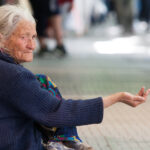The National Center on Elder Abuse differentiates 7 kinds of elder abuse; physical, sexual, emotional, financial/material exploitation, neglect, abandonment, and self neglect. The most common type is neglect. Abuse can occur in the home or long term care setting like assisted living. While the effects of physical abuse can be obviously seen, many other kinds are insidious and can be hard to identify. Let’s take a look at each kind and some examples of them that are not easily seen.
Physical abuse is obvious when there are bruises or broken bones but many times nurses and doctors have to play detective and figure out what is happening based on patterns. Repeat hospitalizations for similar injuries, delayed medical care for an injury, trips to different emergency rooms, or poor explanations for how an injury occurred can all be signs.
Sexual abuse includes any sexual contact with a patient who has dementia as they are unable to consent to contact. Common clues can be blood stained underwear, pain around the pelvis region, social withdrawal, or inappropriate sexual behavior.
Financial abuse is the most commonly self reported type according to the Met Life Study of Elder Financial Abuse and costs seniors more than $2.9 billion annually. Examples can be misuse of banking information or credit cards by a trusted individual or taking items of value from the person. Unfortunately the worst cases of this I have ever seen as a nurse were all done by family members.
Emotional abuse can take on many forms like obstructing access to resources or treatment, humiliation, name calling, and intimidation. Signs in an elderly person could be lack of eye contact, isolation, different eating/sleeping habits or trying to hurt someone. The most common type of abuse is neglect which can also be self inflicted. Neglect is a particularly high risk problem in understaffed nursing homes and can manifest as poor hygiene, lack of nutrition, unclean or unsafe living arrangements, unpaid bills, wounds, dehydration and weight loss.
Sadly there are always the cases of people who have no one to even notice they are being abused, and no way of stopping or reporting it. If you see something that looks like it could be abuse, please report it. Elder abuse in the State of Florida is punishable as a felony and everyone in this state is a mandatory reporter. If you suspect elder abuse it can be reported to DCF at 1-800-962-2873 or https://reportabuse.dcf.state.fl.us/ for online reporting. This can be done anonymously if necessary.





